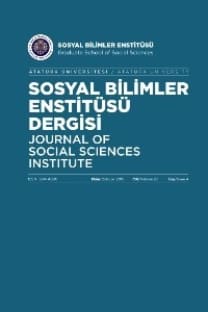Medeniyetin İnşasında ‘Epistemik Topluluklar’-Üstünlük İddiası ve Sömürü İlişkisi: Antik Yunan Üzerinden Bir Değerlendirme/‘Epistemic Communities’ on Founding of Civilization-Relationship between Claim of Superiority and Exploitation: An Evaluation
Öz
Medeniyet kavramı sıklıkla medenileşme süreci üzerinden açıklanmakta ve medenileşmesürecinin somut olarak gözlemlenebilecek unsur ve mekanizmalarına göndermedebulunulmaktadır. Sanatsal zevk ve uğraşlar, mimari, okuma-yazma, yazılı eserlerüretme ve bunların dil yoluyla aktarılması söz konusu unsur ve mekanizmalar arasındazikredilmektedir. Aynı oranda dikkate değer olan diğer bir unsur da, medeni davranış vetavırlarla medeniyete rengini veren kültürün (medeniyetler arası farkların) üretilmesi,yayılması ve devam ettirilmesi olgusudur. Bu bağlamda bilim adamları, din adamları,düşünürler, mimarlar, müzisyenler, şairler ve diğer sanatkârlardan oluşan ve epistemiktopluluk olarak ifade edilebilecek bir topluluğun, toplumsal davranış normlarını oluşturmalarıve toplumun anlam dünyasında yer edecek kavramları üretmeleri, yaymaları veaktarmaları; bir anlamda onları medenileşme sürecinin, dolayısıyla da medeniyet olgusununbirincil aktörleri haline getirmektedir. Şayet medeniyetin varlığı böylesi epistemiktoplulukların varlığına bağlı ise, bu epistemik toplulukların varlığı neye ya da nelerebağlıdır? Bu sorunun birçok cevabından birisi, bahse konu epistemik toplulukların ihtiyaçduydukları zamanın ve üretim imkânlarının yaratılması zorunluluğudur.Bu çalışma söz konusu bu zamanın ve üretim imkânlarının yaratılmasında şiddet vesömürünün yeri ile epistemik topluluklar arasındaki ilişkiyi ve ilişkinin medeniyet sürecineyansıma biçimini Antik Yunan üzerinden yapılacak bir değerlendirmeyle analiz etmeyiamaçlamaktadır.Anahtar Kelimeler: Antik Yunan, epistemik topluluk, sömürü, boş vakit, medenileşme.The concept of civilization is often described through the process of civilizingand the reference of civilization is made to the elements and mechanisms that can beobserved into the process of civilizing. Artistic pleasures and pursuits, architecture,reading and writing, written works and their transferring through language are amongthe aforementioned elements and mechanisms. Evenly other remarkable elements isphenomenon that enlivens the culture by civilized behavior and attitudes, it’s production,spreading and maintenance. In this context, it can be stated that a community can be described as an epistemic community consisting of scientists, religious leaders, thinkers,architects, musicians, poets and other craftsmen. Epistemic communities that make up thesocial norms of behavior and, produce, spread and transfer the social concepts, in a sense,they make them the primary actors of civilizing process and therefore the phenomenon ofcivilization. If the existence of civilization is dependent on the presence of such epistemiccommunities, it depends on what the presence of epistemic communities are? One of themany response of this problem is the necessity of the creation of the needed time andproduction facilities.In this study, it will be discussed the relationship between claim of superiority andexploitation and epistemic communities, in the creation of this time and opportunities forthe production, and the process of civilization, a form of reflection of the relationship.This study will be analyzed through a survey of the ancient Greeks.Keywords: Ancient Greeks, epistemic community, exploitation, leisure time,civilization.
- ISSN: 1304-4990
- Yayın Aralığı: Yılda 4 Sayı
- Yayıncı: Atatürk Üniversitesi Sosyal Bilimler Enstitüsü Müdürlüğü
Sayıdaki Diğer Makaleler
Way to Self Identity: Examples from African-American Cultural Writings on Problems of Integration
Bülent Cercis TANRITANIR, Ahmet BEŞE
XVII. Yüzyılın İkinci Yarısında Kütahya Kazâsı
Rize İlinde Kivi Üretiminin Coğrafi Esasları
Bilgi Teknolojilerinin Örgüt Kültürü Üzerine Etkileri: Büyük Ölçekli İşletmelerde Bir Uygulama
